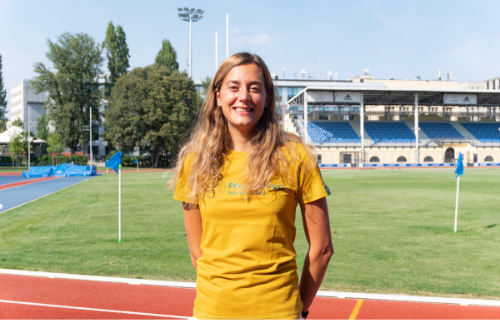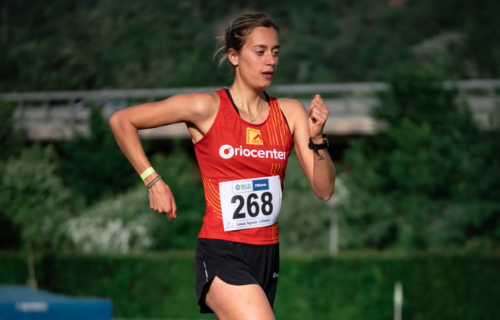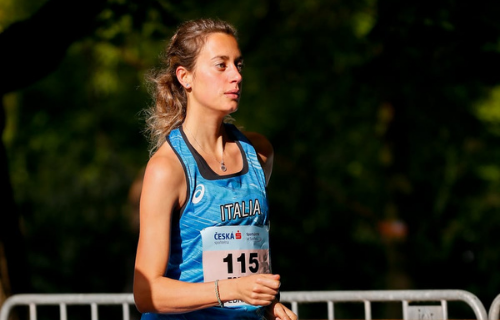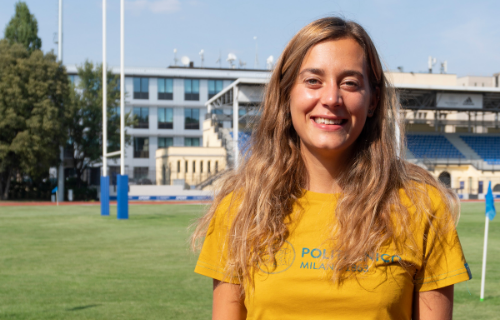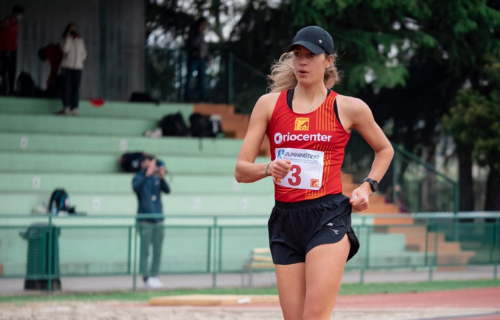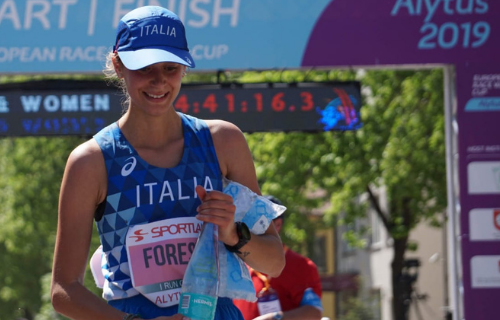Atleti Polimi - Beatrice Foresti
Interview with the race walking champion, Communication Design student at Politecnico di Milano
We meet Beatrice Foresti, born in Bergamo almost exactly 23 years ago, and race walker on a national level for several years now. She has always cultivated a passion for drawing and a desire to experiment: after studying languages at high school she chose Politecnico di Milano, where she is doing a Laurea Magistrale (equivalent to Master of Science) in Communication Design. Her interests mainly focus on the fields of illustration, graphic design and programming.
Hi Beatrice. Tell us how your passion for race walking began.
I started doing athletics at the age of ten, following in the footsteps of my older brother. From the moment I saw him on the track, I was struck by his quirky yet elegant gait and immediately wanted to try out this sport calling for resistance and technique. And I have never stopped since.
Is being a race walker easy in Italy?
I am lucky because race walking has always been an important speciality in the Bergamo area. Also on an Italian level, our race walking school is one of the most prestigious. Suffice to think that this year two of our Olympic golds in Tokyo were won by race walkers!
Which of the races you have competed in was the most thrilling?
I think the recent European race walking team championships in Podebrady in the Czech Republic, in May 2021. On that occasion, I took part in the 35 km women’s race, finishing with a personal best and a good individual placing, plus a gold for our team.
My season didn’t get off to the best of starts and in fact I was only called up for the Europeans at the last minute, and so just being able to take part was hugely satisfying. And yet it wasn’t just the good result that was exciting, but the race itself. Over those three hours I felt a rising rush of adrenaline and joy, thanks also to support for the team and encouragement from my team mates, which helped me overcome the fatigue and get such good results.
What do you consider your biggest sporting success?
On a personal level, my biggest sporting success was my second 50 km at the European team championships in Alytus in 2019. It was my first race as part of the Italian national team and I was really happy and terrified at the same time. It was a really long race, but to hit the finish line smiling after more than four hours, with a personal best to boot, in a sport that finds it hard to take women seriously, was my first step into the world of “grown up” athletics (I was still 20) and, for me, a success.
What does sport mean for you? Do you think it has taught you something also in other areas of your life?
Sport in general, and athletics in particular, for me are commitment and passion: concepts that you also find in other areas of your life, like your studies and relationships. Passion includes fun, emotion and the joy that only sport can give you. At the same time, your commitment must be voluntary and not a burden. I don’t think you can have one without the other.
At times, race walking brings me satisfactions and emotions that are worth much more than the effort it takes to race and train. Dialogue and sharing with others, just like in relationships, are fundamental. It is not always easy, but sport teaches me that patience, organisation and dedication repay you, just like in life, only if you are backed by a real passion for what you do.
Why did you decide to study Communication Design? And why at Politecnico di Milano?
I have always been crazy about creativity, to put it one way. Even as a little girl, I loved to draw, invent stories, and do crafts. After studying languages at high school, I decided to follow my passion and when I came across the Communication design faculty almost by chance, I was instantly hooked. Politecnico di Milano for me is the most suitable place for this course, thanks to the professionalism, wide choice of courses and the local and international stimuli it provides.
How do you juggle sport and study?
With a little organisation. I decided to study in Milan and commute, so that I could train in Bergamo and the province, where I live and where my team is based. It’s not always easy; some periods are harder than others due to long training sessions, which are normal for a resistance sport like mine, and big projects. And yet, thanks to flexible training times and being able to personally manage my project, I have always succeeded in juggling sport and study, trying to organise my time efficiently, and obviously also allowing myself time to rest and have fun.
Does the Dual Career programme help you in this?
It is, in effect, fundamental for me, allowing me to take part in national meets in preparation for more important races. It is an excellent tool for management of lectures with compulsory attendance during retreats, meaning I don’t lose ground or get penalised with projects and laboratory activity. Plus, it also offers support with exam management during race periods, but I haven’t needed that yet.
What advice would you give an athlete who doesn’t know whether to enrol at university or not?
Don’t be afraid, and continue to train in both directions. I think that giving equal importance to studies and sport is more than legit and the one doesn’t rule out the other. It is really important to increase your personal culture, also with a view to a future in a sector other than sport. And so I think that universities must offer increasing support to their sporting students, to allow them to also cultivate this other passion of theirs.
What else do you like doing, besides sport and studying? Do you manage to find time to have a personal life?
Since the age of 13, as you can imagine, most of my private life has rotated around sport, especially where friends are concerned. And yet I also manage to find time for things not linked to sport and study.
I really like to explore and go off into the mountains on the few free weekends I’m not training or racing. Another great hobby of mine is cooking. I find cooking really relaxing, and I adore experimenting new recipes even if those who know me are aware that I have disasters in the kitchen from time to time.
What’s Milan like, compared to your Albano Sant’Alessandro? What do you like about this city?
Milan is a totally different environment compared to the town I live in, in the province of Bergamo. It is much more chaotic, but I find its continual movement and size compelling. Here I can discover places and things that never come to the fore in a small town.
What are your goals and dreams, sporting and otherwise, for the future?
The courses and laboratories I am doing are giving me the opportunity to discover lots of possible paths for my future that I would never have expected. I imagine a future in Communication Design, but I don’t yet know which sector exactly. Illustration is definitely one that I like more than others.
From a sports point of view, I see my future as still open to all sorts and I like to live it as if it were a dream. Every year I try to set myself small personal goals, to follow my passion and continually raise the bar higher. While still fitting in the other part of my life.
To find out about the Dual Career programme, which helps our students who practise sport at the highest level to pursue both their sporting and educational activities with confidence and success, visit the Polimi Sport website.


